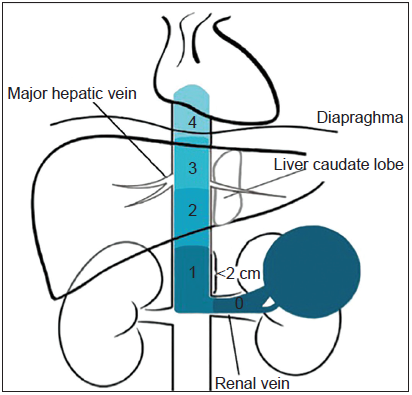Objective: Renal cell carcinoma (RCC) is a tumor that has a tendency of vascular invasion by extending to the inferior vena cava (IVC) after the renal vein. The total resection of the renal tumor and tumor thrombus is considered the optimal treatment. In our study, we aimed to present the results related to 34 consecutive cases of RCC with tumor thrombus.
Material and methods: Of the 442 patients diagnosed with renal tumors between January 2008 and January 2018, 34 (7.6%) had tumor thrombus over the renal vein extending to the IVC. The data of the 34 patients with tumor thrombus were retrospectively reviewed and included in the study. All the 34 patients underwent radical nephrectomy with tumor thrombectomy. The presence of thrombus was evaluated using contrast-enhanced abdominal tomography, magnetic resonance imaging, or color Doppler ultrasonography. The level of thrombus was classified using the Mayo Clinic tumor thrombus classification. Surgery was performed transperitoneally through a modified Chevron incision and mostly in collaboration with other clinics. Complications were classified according to the Clavien system.
Results: Of the 34 patients, 22 were males and 12 were females. The mean follow-up period was 36±27.2 months in patients who had a mean age of 61±10.9 years. The mean tumor size was 10.5±3.3 cm. The number of patients according to the thrombus levels I, II, and III were 20, 9, and 5, respectively. The average blood loss was 744±285.4 mL. Radical surgery for all patients who had direct invasion to the vena cava wall and/or level II and III was performed by gastrointestinal and cardiothoracic surgeons. Cardiopulmonary bypass was not performed in any patient. Minor complications (Clavien grades 1-2) were seen in 8 (23.5%) patients, while 2 (5.8%) patients had major complications (Clavien grades 3–5). The mean follow-up period was 36 months (range, 6–72 months). The overall 5-year survival rate was 85.2%.
Conclusion: We think that radical nephrectomy and caval thrombectomy is a safe and effective method in patients with RCC without tumor exceeding the diaphragmatic level. We believe that the surgical success rate can be increased using a multidisciplinary approach in selected cases.
Cite this article as: Topaktaş R, Ürkmez A, Tokuç E, Kayar R, Kanberoğlu H, Öztürk Mİ. Surgical management of renal cell carcinoma with associated tumor thrombus extending into the inferior vena cava: A 10-year single-center experience. Turk J Urol 2019; 45(5): 345-50.

.png)
.jpg)
.png)
.png)
